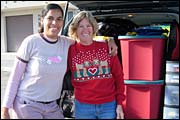California congregation forms ties with Tijuana families
Unitarian Universalist fellowship delivers food, supplies, and letters to new-found friends in Tijuana.
The fellowship, in Solana Beach, already had a connection to several Tijuana colonias or neighborhoods. Four years ago it began sending donations to families there at Christmas. Members have also raised money for nine homes that they helped build there in recent years. So it was natural that when the economy soured, the congregants, inspired by Faller, would go the extra mile.
“We started by asking for donations of household items and then before long it became apparent that the families in the neighborhoods we visited could use food,” said Faller. “Two factories had closed, and many people were out of work.”
In a program patterned after Family-to-Family, a U.S. hunger relief program that links “families with more to families with much less,” according to its website, Faller asked San Dieguito congregants to help. She named her program Family A Familia.
“One Sunday I put up a poster board at church with the photos of 14 Mexican families. There was an overwhelming response,” she said. Now, each month several families join in packing a large box for a Mexican family.
Once a month Faller loads 14 food boxes into her van and a trailer and makes her rounds in the colonia. The boxes contain more than food. Lots of letters and family photos go back and forth. The children in each of the families write letters and send drawings. “We have created some pen pals,” said Faller. “Yesterday I picked up 23 letters from a third grade class in the Mexican colonia and delivered them to a third grade class here that one of our fellowship members is affiliated with.”
She added, “And now the people in Mexico are no longer ‘those illegal aliens.’ They are families we are getting to know. What makes this program different from just writing a check is that it builds relationships.”
Three times a month she loads up with used building supplies—doors and windows, etc., also collected by fellowship members and donated by local contractors and others.
The project has created other opportunities as well. When a high school student at the fellowship wanted some community service hours she volunteered to translate letters sent from Mexico. Plus, about six of the families have traveled to Mexico to meet their counterparts.
“This program has been very rewarding for me,” said Faller, who spent 20 years in a “high-tech corporate career,” and is now a semi-retired life coach. “My days in Mexico are what nourish me the rest of the week. The relationships, the family connections, the outright love I feel when I’m there. Those of us in the U.S. can be somewhat isolated from each other.”
The program, now in its fourth month, is designed to run for only a year. After that, Faller hopes, most families will no longer need help because the job situation will have improved.
Sara Knapp and her two children Bryan, 4, and Carolyn, 8 pack a food box each month. “The kids are very enthusiastic,” said Knapp. “This is 30 miles away from us, yet there’s this huge disparity. To be part of this changes our worldview. This feels like we’re making a difference.”
See sidebar for links to related resources.








